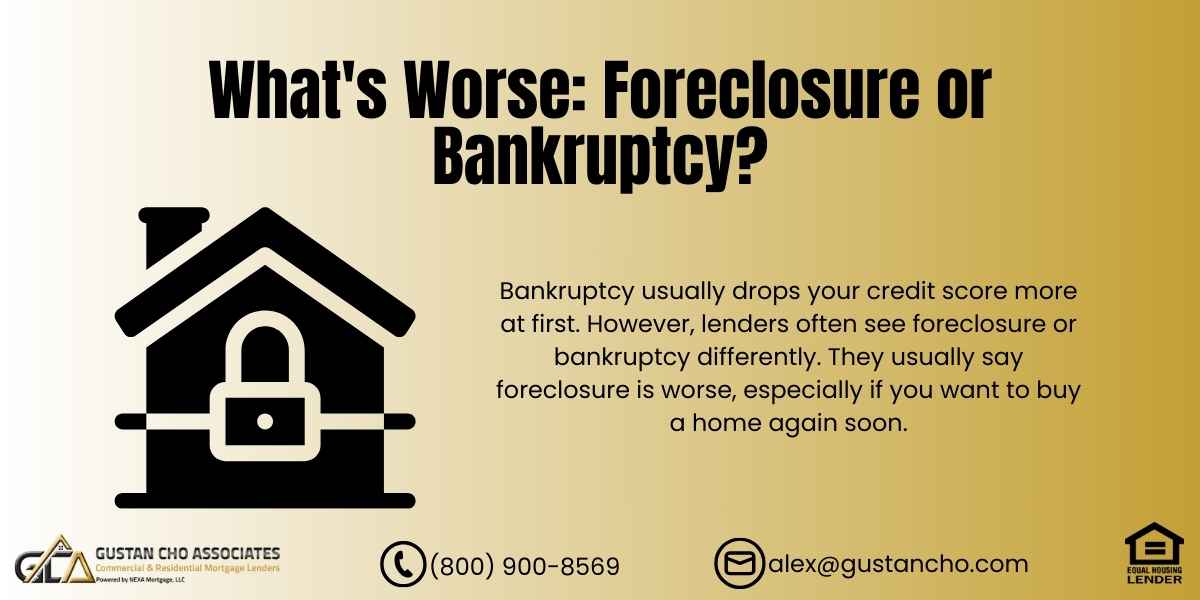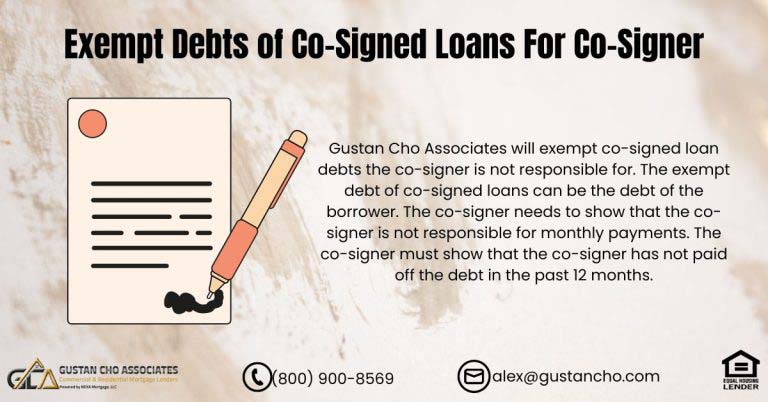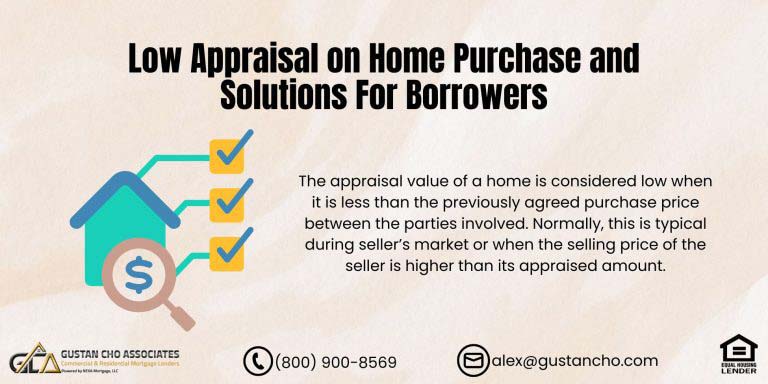Foreclosure or Bankruptcy: What’s Worse and How to Recover Fast
Thinking about foreclosure or bankruptcy? You’re not alone.
When money’s tight, and bills are stacking up, choosing between foreclosure or bankruptcy can feel like picking the lesser of two evils. But here’s the truth: both hurt—but one might hurt less depending on your goals—especially if repurchasing a home is part of your plan.
At Gustan Cho Associates, we’ve helped thousands of people bounce back from either one. Let’s break down which is worse, what it means for your credit, how to recover, and how you can still get a mortgage—even after foreclosure or bankruptcy.
What Is Foreclosure?
Foreclosure or bankruptcy can happen when someone can’t repay the money they owe. Foreclosure means that the bank takes your house back if you stop paying your mortgage. They do this because they want to get their money back. Bankruptcy is when someone asks a court for help to pay off their debts. Both situations can be challenging and change a person’s life a lot. Knowing what these terms mean is important so you can make better decisions with your money.
Here’s how it usually plays out:
- You miss a few payments
- The bank sends warnings
- After about 3–6 months, the foreclosure process starts
- Your home gets sold at auction
Foreclosure or bankruptcy sounds scary, but foreclosure usually means losing your home.
What Is Bankruptcy?
Bankruptcy is a legal way to wipe out or reorganize your debts. There are two types most people file:
- Chapter 7: Wipes out most debts. It’s fast—about 4 to 6 months. You may lose some assets.
- Chapter 13: You keep your stuff but make payments over 3–5 years to catch up.
Bankruptcy doesn’t always mean you’ll lose your house. In fact, it can sometimes help you keep it.
So, when comparing foreclosure or bankruptcy, it depends on whether you want to keep your home and how much debt you have.
Ready to Get Back on Track After Bankruptcy? You Can Still Qualify for a Mortgage!
Apply Now And Get recommendations From Loan Experts
Foreclosure or Bankruptcy: Which Hurts Credit More?
Short answer: Bankruptcy often hits your credit score harder at first.
When people talk about foreclosure or bankruptcy, they often wonder which is worse for their credit score. The reality is that bankruptcy typically impacts your score negatively in the beginning.
If you declare Chapter 7 bankruptcy, your credit score could decrease from 130 to 240 points. On the other hand, a foreclosure usually lowers it by 85 to 160 points. The drop can be even bigger if you had great credit before filing for bankruptcy.
However, it’s important to remember that most of the damage to your credit happens before you go through bankruptcy or foreclosure. This is usually due to missed payments, collection accounts, and charge-offs. In the end, whether foreclosure or bankruptcy is worse depends on what happens before and after these events.
How Long Do Foreclosure and Bankruptcy Stay on Your Credit Report?
When choosing between foreclosure or bankruptcy, knowing how long these things stay on your credit report is important. A Chapter 7 bankruptcy may appear on your credit report for ten years, while a Chapter 13 bankruptcy stays for seven years. A foreclosure will also be on your report for 7 years. So, if you are trying to decide, remember that both Chapter 13 and foreclosure will go away faster than Chapter 7.
Can You Get a Mortgage After Foreclosure or Bankruptcy?
Absolutely! That’s what we focus on at Gustan Cho Associates. Many of our clients get approved faster than expected, even after experiencing foreclosure or bankruptcy.
FHA Loans
For FHA loans, if you had a Chapter 7 bankruptcy, you can apply for a new mortgage after 2 years. If you have undergone a Chapter 13 bankruptcy, you can submit an application after only one year, provided you are continuing your payment plan and have the trustee’s approval. If you went through a foreclosure, you can apply for an FHA loan after 3 years. This makes FHA loans more forgiving if you’ve faced foreclosure or bankruptcy.
VA Loans
The wait times for VA loans are similar. After a Chapter 7 bankruptcy, you can apply after 2 years. If you had a Chapter 13 bankruptcy, the wait is only 1 year. VA loans allow veterans to apply for a mortgage again two years after a foreclosure, providing them an opportunity to rebuild their lives more quickly following a foreclosure or bankruptcy.
Conventional Loans
When it comes to conventional loans, the wait time is longer. If you have filed for Chapter 7 bankruptcy, you must wait four years before you can apply again. For Chapter 13 bankruptcy, you can apply 2 years after your discharge or 1 year into your payment plan with trustee approval. If you faced a foreclosure, you’ll need to wait 7 years for a conventional loan, but it can be shorter if you have special circumstances.
Tip: VA and FHA loans are often more forgiving. If you’re a veteran or can qualify for an FHA loan, you may be able to get back on the road to homeownership sooner than you think. If you’re worried about foreclosure or bankruptcy, remember—it’s not the end of the road. A good loan officer can help you write a letter of explanation and make your case.
How to Rebuild Your Credit Fast
Whether you went through foreclosure or bankruptcy, the road to recovery starts with these steps:
- Make all payments on time: Always make your payments on time. This helps show that you are responsible with money.
- Don’t take on new debt unless needed: Try not to take on new debts unless needed. It’s better to focus on paying off what you already have.
- Use a Secured Card or Credit Builder Loan: Look into getting a secured credit card or a credit builder loan. These can help build your credit back up.
- Keep your credit use low: Use less than 30% of your total credit limit. If your limit is $1,000, try to keep your balance below $300.
- Check Your Credit Reports: Look at your credit reports for mistakes. If you find something wrong, challenge it to get it fixed.
Even after foreclosure, we’ve seen clients hit a 700+ credit score within 12–24 months by following this plan. Bankruptcy.
Foreclosure or Bankruptcy: Which Is Easier to Recover From?
If you’re trying to buy a home again, here’s what lenders care about:
- Did you walk away from your mortgage? Foreclosure is a red flag to mortgage lenders.
- Did you make an effort to pay back your debt? Chapter 13 filers often look better to lenders.
- Do you now have a stable income and no new missed payments?
So what’s worse—foreclosure or bankruptcy?
Lenders usually say: Foreclosure is worse—especially if you want another mortgage. Chapter 13 can actually be seen as responsible because it shows you tried to pay what you could.
Real Talk: What Should You Do?
If you’re behind on your mortgage or drowning in credit card debt, don’t wait.
Here are your options:
- Call a credit counselor before missing payments.
- Ask your lender about loan modification or forbearance.
- If you can’t recover, talk to a lawyer about bankruptcy options.
- If the home no longer makes sense to keep, a short sale or deed-in-lieu of foreclosure might be better than a full foreclosure
At Gustan Cho Associates, we also help people get approved for a mortgage after they’ve experienced hardship. We don’t have lender overlays and follow only the official guidelines.
FHA, VA, and Conventional Loans – Explore options that allow for mortgage approval even after bankruptcy
Apply Now And Get recommendations From Loan Experts
Your Next Steps: Get Approved with Gustan Cho Associates
If you have faced foreclosure or bankruptcy or are still deciding on the best options for your situation, our team at Gustan Cho Associates is ready to help you. We understand that it can be tough to get a loan when many banks say no. That’s why we approve loans that others won’t. Our services include FHA, VA, Conventional, non-QM, and bank statement loans.
We know that credit problems, job gaps, self-employment, and low credit scores can make things difficult. If you are ready to start fresh, you can click below to get pre-approved in just a few minutes or call us for a free consultation. We’re here to support you! Call or text us at 800-900-8569 or email gcho@gustancho.com.
Final Thoughts
Choosing between foreclosure or bankruptcy isn’t easy. But one thing’s for sure—you can recover from either. The key is acting fast, staying on top of your payments, and working with the right team.
At Gustan Cho Associates, we don’t judge—we help. If you’ve gone through a financial hardship, we’re ready to guide you back to homeownership.
Frequently Asked Questions About Foreclosure or Bankruptcy:
Q: What’s Worse for Your Credit: Foreclosure or Bankruptcy?
A: Bankruptcy usually drops your credit score more at first. However, lenders often see foreclosure or bankruptcy differently. They usually say foreclosure is worse, especially if you want to buy a home again soon.
Q: How Long Does Foreclosure or Bankruptcy Stay on My Credit Report?
A: Foreclosure and Chapter 13 bankruptcy stay for 7 years, while Chapter 7 bankruptcy stays for 10 years. So, when choosing foreclosure or bankruptcy, remember that Chapter 13 and foreclosure fall off sooner.
Q: Can I Buy a House Again After Foreclosure or Bankruptcy?
A: Yes! You can get a mortgage again with an FHA or VA loan just 1–3 years after foreclosure or bankruptcy. At Gustan Cho Associates, we help people get approved every day, even after hard times.
Q: Will I Lose My Home if I File for Bankruptcy?
A: Not always. Filing Chapter 13 might let you keep your home while you catch up on payments. When deciding on foreclosure or bankruptcy, bankruptcy might help you stay in your house.
Q: What Causes More Damage to My Credit Score—Foreclosure or Bankruptcy?
A: Bankruptcy often causes a bigger score drop up front. But many people have already missed payments before either happens. Both foreclosure and bankruptcy hurt, but your credit can bounce back quickly.
Q: How Soon Can I Apply for an FHA Loan After Foreclosure or Bankruptcy?
A: You can apply:
- 2 years after Chapter 7 bankruptcy
- 1 year into Chapter 13, with trustee approval
- 3 years after foreclosure
- FHA loans are forgiving after foreclosure or bankruptcy if you’ve rebuilt your credit.
Q: Which One Looks Better to Mortgage Lenders: Foreclosure or Bankruptcy?
A: Lenders often prefer bankruptcy, especially Chapter 13, because it shows that you tried to pay back what you could. While foreclosure and bankruptcy both affect your loan options, foreclosure is often viewed more negatively.
Q: Can I Fix My Credit After Foreclosure or Bankruptcy?
A: Yes! Make timely payments, keep debt low, and use secured credit cards. With the right steps, many people recover from foreclosure or bankruptcy and reach a 700+ credit score in 1–2 years.
Q: Should I Talk to Someone Before Going Through Foreclosure or Bankruptcy?
A: Indeed, a loan officer or credit counselor can outline your options. If you have doubts about foreclosure or bankruptcy, consulting with an expert can help you identify the best option for you.
Q: Where Can I Get Help with a Mortgage After Foreclosure or Bankruptcy?
A: Right here! Gustan Cho Associates specializes in helping people get approved after foreclosure or bankruptcy. We don’t have lender overlays and follow only the official loan rules. Contact us today to get started.
This blog about “What’s Worse: Foreclosure or Bankruptcy?” was updated on April 3rd, 2025.
Take control of your future—let’s make homeownership possible even after bankruptcy!
Apply Now And Get recommendations From Loan Experts










